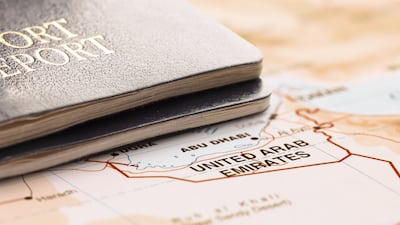The UAE has emerged as a melting pot for diverse businesses, attracting entrepreneurs and enterprises from all corners of the world.
The dynamic hub’s strategic location, business-friendly policies and modern infrastructure have fostered an environment conducive to innovation and growth.
In addition, the UAE’s open economy and free zones offer numerous incentives, including 100 per cent foreign ownership, tax exemptions and streamlined regulations, making it an ideal destination for international companies seeking to establish a presence in the Middle East.
World's most powerful passports – in pictures
It is no surprise that in this increasingly interconnected and globalised world, businesses and entrepreneurs in the UAE are constantly seeking to expand their reach and seize international opportunities.
One way of doing this is using the UAE’s position as a travel hub to visit other countries for conferences and further networking.
Unfortunately, not all passports carry the same level of strength.
For those with passports that need to obtain a visa to certain countries, the traditional application process can present significant hurdles that hinder the mobility and growth potential of people and their companies, leading to time-consuming delays and additional costs.
This is where obtaining a second passport can be a game-changer, offering businesspeople in the UAE greater freedom of movement and enhancing their company’s global branding.
Here are a few more reasons why getting a second passport can help to bring you and your business to new heights.
Global mobility and business opportunities
Global mobility is the cornerstone of modern businesses. Entrepreneurs and business leaders are constantly on the lookout for potential markets, partnerships and investment opportunities across borders.
A second passport can significantly enhance their ability to travel seamlessly to foreign countries, opening up new horizons and expanding business networks beyond domestic borders.
With greater mobility, entrepreneurs can attend international conferences, negotiate deals and explore untapped markets, ultimately leading to increased business growth and success.
Overcoming visa hurdles
The traditional visa application process can be lengthy, uncertain and burdensome, often requiring people to undergo rigorous background checks and provide extensive documentation.
Delays in visa approvals can lead to missed business opportunities, affecting a company's reputation and hindering its expansion plans.
Having a second passport can alleviate these challenges by providing visa-free or visa-on-arrival access to numerous countries.
This newfound freedom can save valuable time and resources, enabling businesspeople to focus on their core objectives and seize opportunities promptly.
Strengthening global branding
In the global business landscape, reputation and branding are critical.
A second passport from a country known for its strong international standing can positively affect a business's image.
It reflects that the businessperson is a global citizen with ties to multiple jurisdictions, fostering trust among potential partners and clients worldwide.
As businesses increasingly operate across borders, having strong global branding is an invaluable asset that can lead to increased credibility and, consequently, more opportunities.
Diversification and risk management
In an unpredictable geopolitical climate, having a second passport can act as a form of insurance against unforeseen risks.
It provides a safety net in case of political instability, economic downturns or sudden changes in visa regulations in the home country.
Diversifying citizenship can offer entrepreneurs and their families greater security and flexibility, ensuring that their businesses can continue to thrive regardless of external challenges.
Access to favourable business jurisdictions
Some countries offer unique business advantages, such as favourable tax regimes, business-friendly regulations and access to global financial markets.
By obtaining a second passport from one of these jurisdictions, entrepreneurs can tap into these benefits and optimise their business operations.
Moreover, having a presence in several countries can facilitate cross-border transactions and help businesses to avoid excessive bureaucracy and red tape in certain regions.
Cultivating a global mindset
In 2023, the business landscape demands adaptability, agility and a global mindset.
Furthermore, having a global mindset is crucial in the current business landscape and a second passport can create a powerful synergistic effect, leading to exponential growth and international success.
However, it is crucial to note that the process of obtaining a second passport is subject to various legal and regulatory considerations.
Engaging with experienced immigration professionals and legal advisers is vital to navigate the complexities involved and ensure a smooth and lawful transition.
With careful planning and the right strategies, a second passport can become a catalyst for unparalleled opportunities.
Veronica Cotdemiey is chief executive of Citizenship Invest













